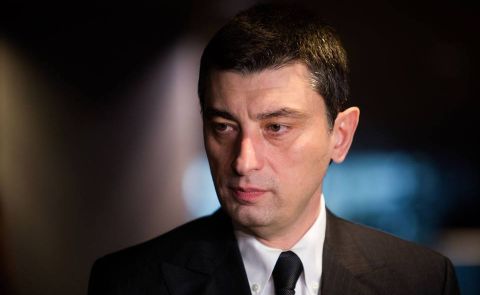
Georgian elections: Georgian Dream wins 48% in the first round of the votes

Results and reactions from the ruling party
On 31 October the parliamentary elections in Georgia were held. According to the preliminary results of 3847 polling stations the ruling "Georgian Dream-Democratic Georgia” coalition (GD) has won 48.15% of votes, followed by the United National Movement with 27.14%, European Georgia - Movement for Freedom (EG) 3.78%, Alliance of Patriots 3.14%,Strategy Agmashenebeli 3.15%,Lelo 3.15%, Girchi 2.89%, Aleko Elisashvili-Citizens 1.33% and Labour Party 1%.
The voter turnout stands at 56.11%. The Central Electoral Commission (CEC) said that the most active polling station was in Racha-Lechkhumi and Svaneti, where 63.8% of registered voters cast their votes. The least number of voters (51%) was registered in the Kvemo Kartli region.
However, the Georgian Ministry of Internal Affairs reported that it started investigations into nine incidents that were observed during the parliamentary elections. The Ministry stated that in total 10 individuals were arrested in relation to seven cases of administrative violations.
The Chairman of the GD Bidzina Ivanishivli stated that Georgia made a decent choice today and thanked the voters. “Once again, I promise that the Georgian Dream will remain a people’s party and will remain in the service of the people. Long live our future victories, long live our country” he added.
GD Executive Secretary Irakli Kobakhidze stated that as of now the party has received 62 seats in parliament in the proportional elections, while GD majoritarian candidates in 14 of 30 election constituencies have won the race in the first round of the elections (by having received at least 51% of the vote). “We will win all 30 majoritarian constituencies after the second round of the elections and will have at least 92 MPs in parliament,” Kobakhidze said, adding that the ruling party would have taken at least 60% of the vote in the proportional elections if the elections were held last month.
Reactions from the opposition
Eight of nine opposition parties which passed the threshold already announced their intention to boycott their mandates in the parliament.
“Ivanishvili stole the victory last night, re-wrote election protocols. I do not do anything for me, but I want to tell the Georgian youth, do you want to live in a free country, or you don’t want Georgia to be your motherland or living place? If we do not respond to Ivanishvili with full strictness, with public reaction, Georgia, as a country, your motherland with signs of democracy, will stop existence and will become a disgusting, last-class political supplement of Russia,” said UNM’s candidate for Prime Minister spot Mikhaeil Saakashvili.
“From tomorrow, we will declare mass mobilisation. I will not give the possibility to Ivanishvili to steal the choice of Georgian people. Stand strong, we will protect the right of our victory to the end. Either we become Belarus, [the] Russian Federation or [a] Middle Asian dictatorship or we become a free country where citizens can live normally and change governments freely, where freedom of expression is protected and this free will is respected even by a mad ruler,” Saakashvili added.
A day after the elections, opposition politicians gathered in front of the Georgian parliament on central Rustaveli Avenue to protest the results of the CEC. The UNM majoritarian candidate for the Gldani constituency Nika Melia took off his monitoring bracelet in front of his supporters saying that it was “the symbol of injustice” and refusing to wear it anymore. “Will I be imprisoned, or will I be in a war together with you in the coming days, the nation will win” he said.
The leader of Strategy Aghmashenebeli Giorgi Vashadze said that the “opposition must act unanimously” and not enter the parliament. Sergi Kapanadze, the head of the election headquarters of EG, said that the parliamentary elections were not legitimate and it does not express the will of the people. “Ivanishvili decided to rig the elections through violation, bribery which will result in protest and international/internal isolation,” he emphasised. The only opposition party which has not announced its intention not to take up its spots in parliament was Aleko Elisashvili's Citizens.
International reactions
The OSCE ODIHR Mission in Georgia stated that the country’s parliamentary elections were competitive and, overall, fundamental freedoms were respected. “Nevertheless, pervasive allegations of pressure on voters and blurring of the line between the ruling party and the state reduced public confidence in some aspects of the process,” the statement further stated.
The observers concluded that the technical aspects of the elections were managed efficiently, despite challenges posed by the Covid-19 pandemic, but the dominance of the ruling party in the election commissions negatively affected the perception of their impartiality and independence, especially at the lower levels.
“The diverse and pluralistic media environment was polarised along political lines and by business interests, and all monitored private broadcasters were visibly partisan. In the absence of policy discussion and analytical reporting, and with only a few debates between main political alternatives, there was limited opportunity for voters to make an informed choice,” the observers also said.
The legal framework, overall, provided a sound basis for democratic elections. While many recent amendments were welcomed as bringing some improvement, there were concerns about a lack of effective implementation and enforcement in the areas of election administration, the campaign and campaign finance. The observers also noted that aspects of the legislation and certain campaign practices advantaged more established political parties, to the detriment of newer and smaller ones. The overall framework for campaign financing, including high spending limits, also benefited more established parties.
The spokesperson of EU’s External Action Service Peter Stano shared the same view as the OSCE ODIHR. “Ensuring the highest democratic standards throughout the entire electoral process, including during the second round, remains the key issue, as well as a fair, transparent and rigorous handling of all complaints and appeals. It is important that all parties continue to adhere to democratic principles and standards and respect for human rights. Ensuring conditions for a free and pluralistic media environment is extremely important including to allow voters to make a fully informed choice. The European Union will remain very attentive to developments during the remainder of the electoral period and in particular on the day of the second round,” he emphasised.
The MPs in the EU parliament also positively assessed the elections. The joint statement read that candidates were able to campaign freely, 'giving voters a genuine choice between a variety of platforms.’ Also, the MPs said that the media and political landscapes were still highly polarised, which was consequently reflected by harsh rhetoric on all sides, albeit to a lesser extent than in the run-up to the 2018 presidential election, which was a positive development.’ They also appreciate that pragmatic solutions were found to allow quarantined and self-isolated citizens to cast their ballots in special polling stations, which was a fair compromise between democratic and public health requirements.
The EU parliamentarian Viola von Cramon released a separate comment, saying that while the parliamentary elections were competitive and generally free, it was “regrettable to see cases of pressuring voters,” adding that “unequal access to administrative & particularly financial resources undermines democracy.”
The United States Embassy in Georgia welcomed competitive parliamentary elections in the country and applauded citizens for their turnout against the backdrop of the pandemic, while also pointing out deficiencies in the process that require resolution by the authorities. However, the embassy's reaction also noted pervasive allegations of pressure on voters and blurring of the line between the ruling party and the state that reduced public confidence in some aspects of the process. The statement said that the flaws were not sufficient to invalidate the result of the voting but were “unacceptable.” Voters and parties' use of existing legal procedure for filing formal complaints to relevant bodies was also welcomed by the US diplomatic office, which called on authorities to resolve credible complaints in a fair, transparent and timely manner.
Critical remarks
The chief executive director of the International Society for Fair Elections and Democracy (ISFED), Elene Nizharadze stated that the CEC should recount votes from 8% of polling stations where there were more ballots than registered voters. She said that this violation threatens confidence in the current election process and thus requires an immediate response from the election administration. As an example, Nizharadze noted that at a polling station in Saburtalo district of Tbilisi, ballot papers exceeded the number of voter’s signatures by 54. Nizharadze added that similar violations were revealed in the regional towns of Terjola, Akhmeta and Marneuli.
The ISFED also released their parallel vote count. According to their counts the GD won 45.8% (margin of error - 0.7%) , UNM 26.4% (margin of error - 0.6%), EG 3.7% (margin of error - 0.2%), Alliance of Patriots - 3.1% (margin of error - 0.1%), Lelo for Georgia - 3.1% (margin of error - 0.2%), Strategy Agmashenebeli - 3% (margin of error - 0.1 %), Girchi - 2.8 % (margin of error - 0.2%), Elisashvili Citizens - 1.3% (margin of error - 0.1%), and Labour Party - 1% (margin of error 0.1%).
Transparency International Georgia (TI Georgia) stated that the analysis of 170 election-related violations and 46 complaints “made it clear that the Georgian parliamentary elections were a step back compared with the 2016 parliamentary elections.” In its summary of monitoring of the elections, TI wrote that the election day was marked by physical confrontations outside polling stations, obstruction of the work of observers and journalists, including physical attacks on journalists and damaging of their property. The watchdog noted that the CEC published the initial preliminary election results 7.5 hours after the closing of polling stations, which represents a deterioration of the practice established during the elections over the last eight years and gives the opposition parties reason to suspect manipulation occurred in the results.
See Also


Russia Begins 24/7 Radiation Monitoring in Dagestan After Iranian Nuclear Incident

How Do Caucasus States React to Israel-Iran War?

Weekly Brief on Military Situation in the South Caucasus (9–15 June 2025)

Former Georgian PM Gakharia to Face Prosecution

